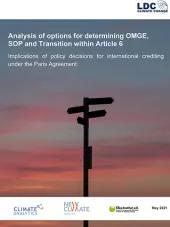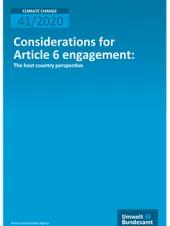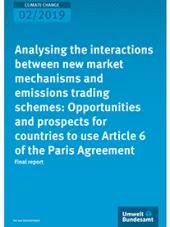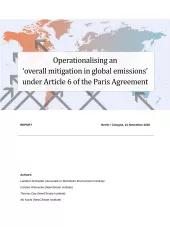In this paper, we discuss the ambition raising implications to engage in voluntary cooperation under Article 6 for the originating Parties. The paper shows why Article 6 should focus on driving mitigation in otherwise inaccessible abatement options and why it is critical that support should only last for a limited time period, after which own action must kick-in. Whilst participation in mechanisms may potentially deliver benefits, the realisation of these opportunities is entirely dependent on the effective design and implementation of measures to safeguard against potential risks that can create conditions for ambition disincentives. The paper identifies four broad safeguards to ensure that instruments developed under Article 6 can deliver effectively on the needs of those who transfer mitigation outcomes, whilst providing positive incentives for ambition raising.
Summary:
Meeting Paris Agreement’s long-term temperature goals requires scaled-up efforts by all countries towards decarbonising their economies. This involves a longer-term vision reflecting countries’ “highest possible ambition” in current NDCs and progression “beyond” the previous effort in successive NDC cycles – or what we call ‘ambition raising’. Ambition raising is embedded as an aspiration in several provisions of the Paris agreement, including for Article 6 approaches, which are expected to “…allow for higher ambition in their mitigation and adaptation actions...” in participating countries. Designing such a role in countries who plan to transfer mitigation outcomes to other countries via Article 6 (i.e. the ‘originating Parties’) will be quite challenging. In this paper, we discuss the ambition raising implications to engage in voluntary cooperation under Article 6 for the originating Parties.
We define three key opportunities from Article 6 to raise ambition – first, by creating an overall global mitigation benefit through the design of instruments under Article 6.4; second, by designing cooperation for non-market approaches taking cognisance of its ambition raising role; third, and most fundamentally, by driving mitigation in inaccessible abatement options.
Whilst participation in mechanisms may potentially deliver benefits, the realisation of these opportunities is entirely dependent on the effective design and implementation of measures to safeguard against potential risks that can create conditions for ambition disincentives. We identify four broad safeguards to ensure that instruments developed under Article 6 can deliver effectively on the needs of those who transfer mitigation outcomes, whilst providing positive incentives for ambition raising.
Designing and implementing effective safeguards will be a challenging process and will require a comprehensive dialogue. When Parties continue to discuss Article 6 rules, a balanced progress that defines strong guardrails against risks to ambition raising will be desirable.









